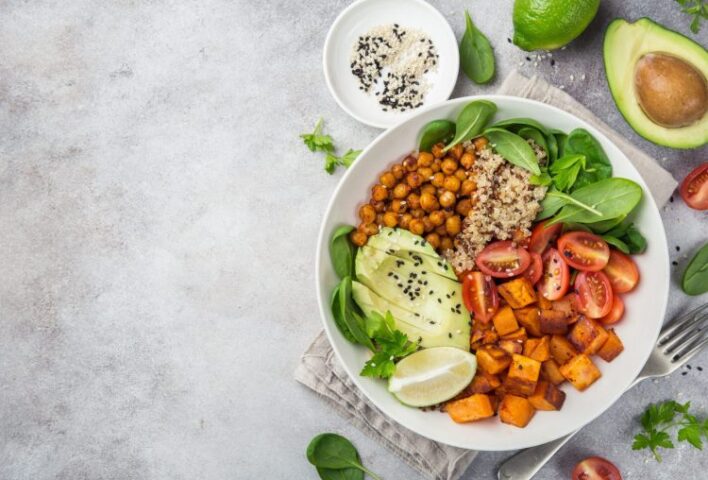Vegetarian and vegan diets over the past 50 years: How have things changed?

Writer Woody River shares her own personal reflection on the changes she has seen, from giving up meat as a teenager to raising her daughter on a vegan diet, and what she hopes for the future.
Last year, I turned fifty. Though I still feel young, fit and healthy, reaching such an age inevitably prompted a certain degree of reflection on how I had chosen to live my life and how I would continue to live it going forward. Other than the birth of my daughter, the single most defining aspect of my life was my decision to become vegan at the age of eighteen, having been vegetarian for four years prior to that.
Not eating meat in 1990 was a very different experience to what it is now. Being vegetarian would have been somewhat challenging, but being vegan required immense dedication, a complete re-education in nutrition and a willingness to go far out of one’s way to find a wholefood store (which were much less common) just to get basics such as lentils and beans.
Added to this was the general view, propagated by the media, that vegetarians and vegans were skinny, unhealthy, pasty-faced creatures who followed ‘extreme diets’ (in the case of vegans) and were also undoubtedly ‘hippies’, an idea which seemed to be based solely on their penchant for lentils. But if you were a student in the nineties, lentils were an absolute necessity – not only were they highly nutritious, but they were also incredibly cheap, and a small handful went a very long way. Apart from Sosmix, there were very few ‘meat alternatives’ at that time.
Of course, all this has changed. Dairy-free ice creams now abound in a multitude of mouth-watering flavours; the majority of foods seem to be labelled ‘vegetarian’ and a large number are now labelled ‘vegan,’ but these changes have taken many decades.
In the noughties, when my daughter was attending a tiny village primary school high on the Mendip Hills in Somerset where the majority of the children were from farming backgrounds, she was the only non-meat eater. In order to ensure she could participate in the annual Christmas dinner, I would take the day off work to cook her a vegan Christmas meal, put it in a suitable heat-proof container and rush it two miles up the hill in the car in order to arrive at the village hall just in time for the children to start eating; correct timing was essential!
In secondary school, I adopted a collaborative approach with the cookery teacher by sending alternative vegan recipes and ingredients just so that my daughter could participate in making the rather unimaginative staples of such lessons: scones and pasta with cheese sauce.

By the 2010s with a much wider range of international foods available in supermarkets, many of which were animal-free, vegetarians and vegans had greater choices. Numerous Hollywood stars, sports personalities and even the former president of the US, Bill Clinton, were by this time following meat-free or even vegan diets. Celebrity chefs were catching on as well, with the well-known former carnivore, Hugh Fearnley-Whittingstall, suddenly focusing on vegetables and encouraging others to do the same. And then there was of course the rise of social media.
It is Instagram that can be credited with making meat-free food more popular. Gone were the images of the dull oaty-brown vegetarian cuisine in faded recipe books of the past; instead, colour-enhanced images of rainbow vegetables and fruit smoothies that oozed health and vitality appeared on our screens on a daily basis. Vegetarian and vegan diets were suddenly cool!
In 2015, the first Veganuary had launched with 12,800 people signing up; eight years later, in January this year, the number of people signing up worldwide had increased by a whopping 5,423% to 706,965. In 2019, according to the National Diet and Nutrition Survey, 4.5% of the UK population were following meat-free diets, equating to 3 million people and, by 2022, according to an Ipsos MORI survey commissioned by The Vegan Society, 600,000 people in Britain were vegan.
Now, the words ‘vegan’ and ‘vegetarian’ are gradually being replaced by the term ‘plantbased’, a more encompassing term which embraces a range of different diets. Though it has been around since 1980, the term ‘plant-based’ should now be credited for the explosion in animal-free alternatives in recent years by making this type of food more acceptable and less polarising, and this is borne out by the statistics. According to Appinio, in 2021 63.5% of UK consumers bought plant-based items and 48% bought plant-based milks, and in a 2021 report published by Bloomberg Intelligence entitled Plant-Based Foods Poised for Explosive Growth, it was stated that the global plant-based food market was worth $29 billion in 2020; by 2030, it is estimated that it will be worth a staggering $162 billion.
When I think back to my younger self becoming a vegan and then raising my daughter as one in the 1990s, constantly feeling that I had to defend that decision against accusations of irresponsibility, constantly explaining our diets to people who wondered ‘what do you eat?’ and constantly justifying our diets to people who wanted to know ‘why?’, I feel a certain vindication that I did make the right decision, not only due to my belief in animal rights but also for our health and for the environment. Science has now proven that eating less meat and more plant-based foods is better for human health, reduces greenhouse gas emissions, saves water, lessens deforestation, prevents habitat destruction which causes loss of biodiversity and… it is cheaper.
I hope that in what remains of my lifetime, thinking will progress to acknowledging the need for greater animal rights as well, especially as it is predicted that there will be a rise in pandemics in the future specifically due to our use and abuse of animals.
